PSY 101: Psychological Theories on Personality and Motivation
VerifiedAdded on 2022/08/29
|5
|1077
|23
Homework Assignment
AI Summary
This assignment delves into various psychological theories, exploring personality, motivation, and habituation. It begins by contrasting psychodynamic and social cognitive theories, highlighting the roles of unconscious drives versus learning and cognitive processes in shaping personality. The assignment then explains habituation, detailing its processes and the factors influencing it, such as stimulus repetition and intensity. Finally, it addresses trait and personality dynamics within the context of employee motivation, differentiating between extrinsic and intrinsic motivation, and discussing how individual traits, competence, and learning contribute to productivity. The paper uses references to support the arguments and theories presented.
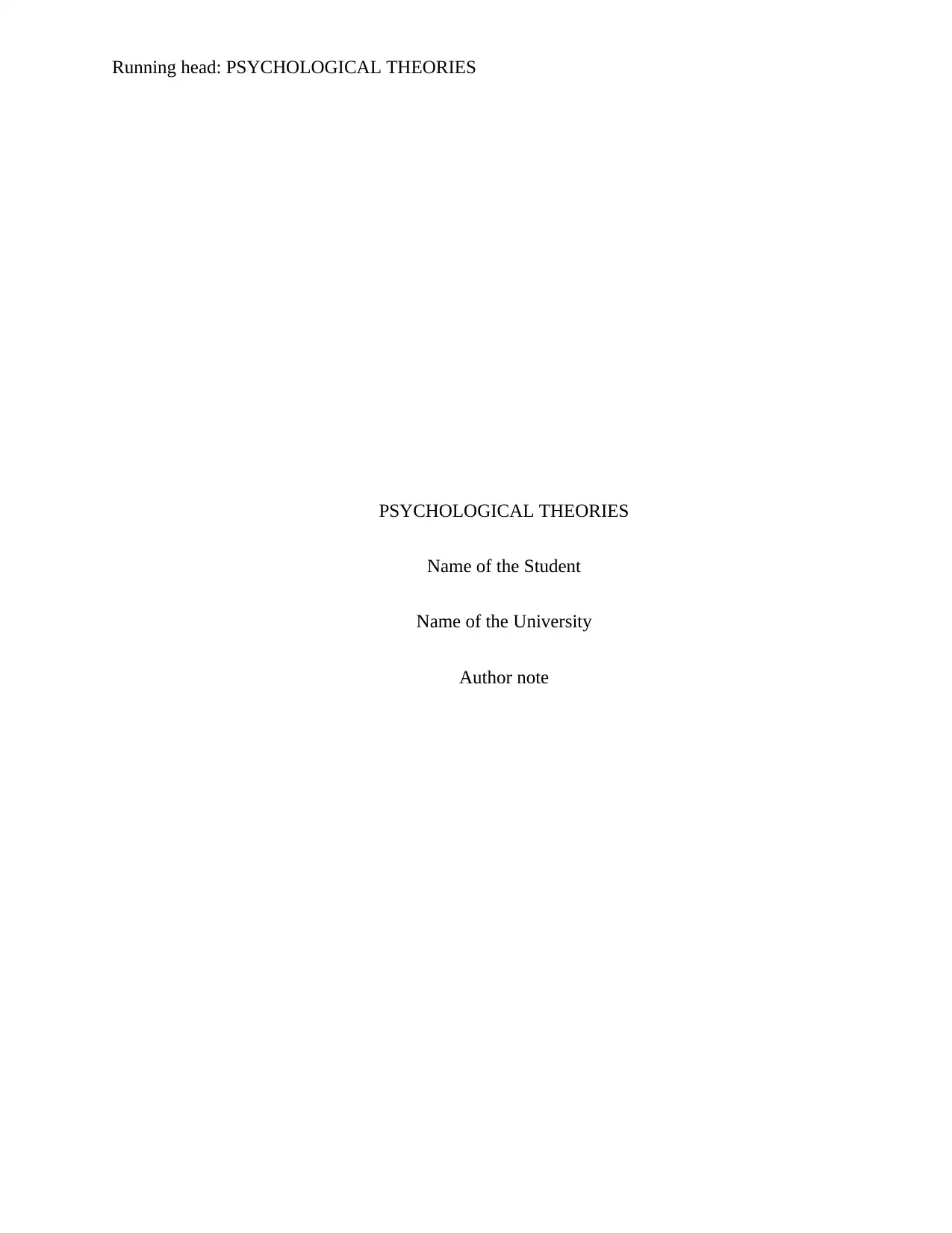
Running head: PSYCHOLOGICAL THEORIES
PSYCHOLOGICAL THEORIES
Name of the Student
Name of the University
Author note
PSYCHOLOGICAL THEORIES
Name of the Student
Name of the University
Author note
Paraphrase This Document
Need a fresh take? Get an instant paraphrase of this document with our AI Paraphraser
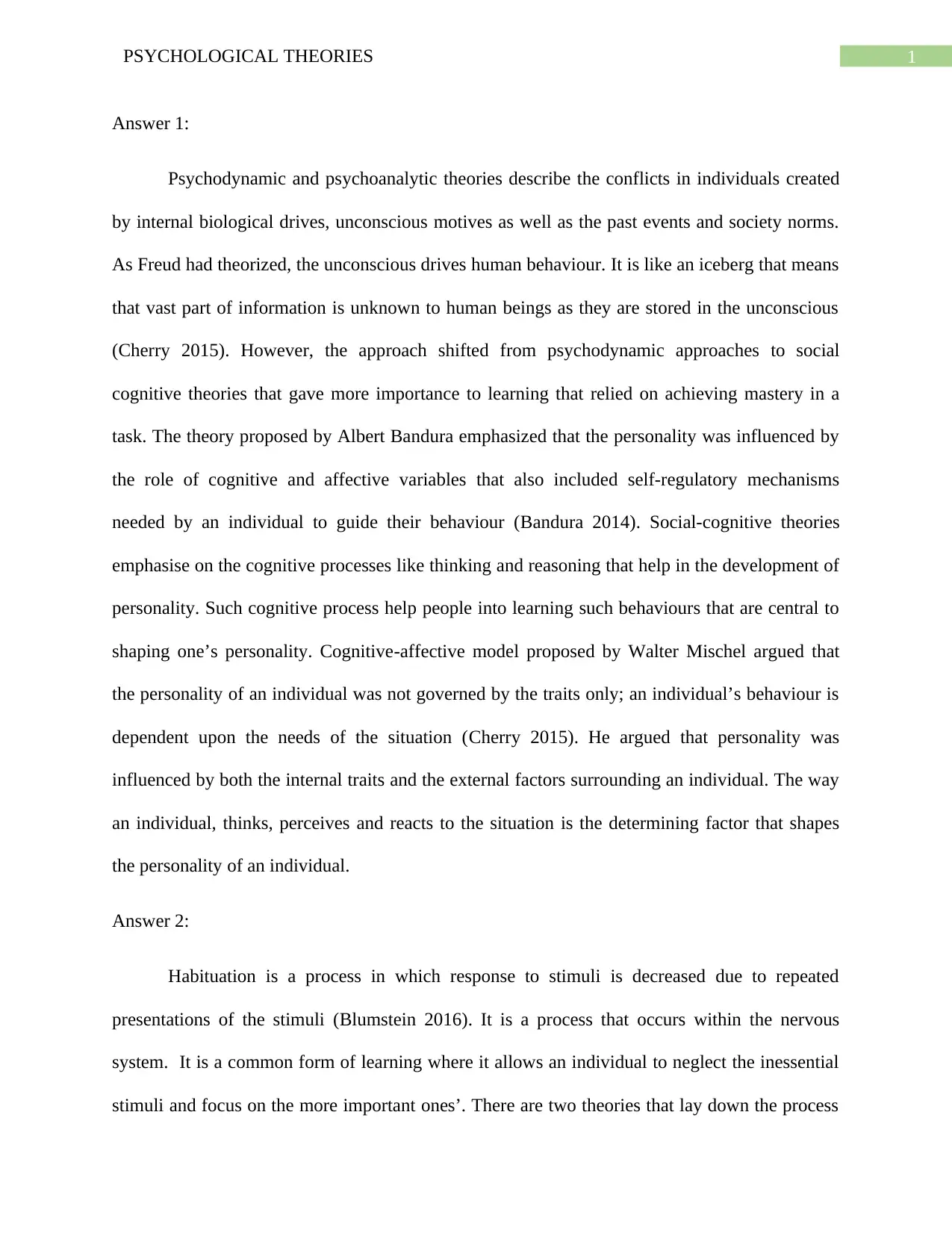
1PSYCHOLOGICAL THEORIES
Answer 1:
Psychodynamic and psychoanalytic theories describe the conflicts in individuals created
by internal biological drives, unconscious motives as well as the past events and society norms.
As Freud had theorized, the unconscious drives human behaviour. It is like an iceberg that means
that vast part of information is unknown to human beings as they are stored in the unconscious
(Cherry 2015). However, the approach shifted from psychodynamic approaches to social
cognitive theories that gave more importance to learning that relied on achieving mastery in a
task. The theory proposed by Albert Bandura emphasized that the personality was influenced by
the role of cognitive and affective variables that also included self-regulatory mechanisms
needed by an individual to guide their behaviour (Bandura 2014). Social-cognitive theories
emphasise on the cognitive processes like thinking and reasoning that help in the development of
personality. Such cognitive process help people into learning such behaviours that are central to
shaping one’s personality. Cognitive-affective model proposed by Walter Mischel argued that
the personality of an individual was not governed by the traits only; an individual’s behaviour is
dependent upon the needs of the situation (Cherry 2015). He argued that personality was
influenced by both the internal traits and the external factors surrounding an individual. The way
an individual, thinks, perceives and reacts to the situation is the determining factor that shapes
the personality of an individual.
Answer 2:
Habituation is a process in which response to stimuli is decreased due to repeated
presentations of the stimuli (Blumstein 2016). It is a process that occurs within the nervous
system. It is a common form of learning where it allows an individual to neglect the inessential
stimuli and focus on the more important ones’. There are two theories that lay down the process
Answer 1:
Psychodynamic and psychoanalytic theories describe the conflicts in individuals created
by internal biological drives, unconscious motives as well as the past events and society norms.
As Freud had theorized, the unconscious drives human behaviour. It is like an iceberg that means
that vast part of information is unknown to human beings as they are stored in the unconscious
(Cherry 2015). However, the approach shifted from psychodynamic approaches to social
cognitive theories that gave more importance to learning that relied on achieving mastery in a
task. The theory proposed by Albert Bandura emphasized that the personality was influenced by
the role of cognitive and affective variables that also included self-regulatory mechanisms
needed by an individual to guide their behaviour (Bandura 2014). Social-cognitive theories
emphasise on the cognitive processes like thinking and reasoning that help in the development of
personality. Such cognitive process help people into learning such behaviours that are central to
shaping one’s personality. Cognitive-affective model proposed by Walter Mischel argued that
the personality of an individual was not governed by the traits only; an individual’s behaviour is
dependent upon the needs of the situation (Cherry 2015). He argued that personality was
influenced by both the internal traits and the external factors surrounding an individual. The way
an individual, thinks, perceives and reacts to the situation is the determining factor that shapes
the personality of an individual.
Answer 2:
Habituation is a process in which response to stimuli is decreased due to repeated
presentations of the stimuli (Blumstein 2016). It is a process that occurs within the nervous
system. It is a common form of learning where it allows an individual to neglect the inessential
stimuli and focus on the more important ones’. There are two theories that lay down the process
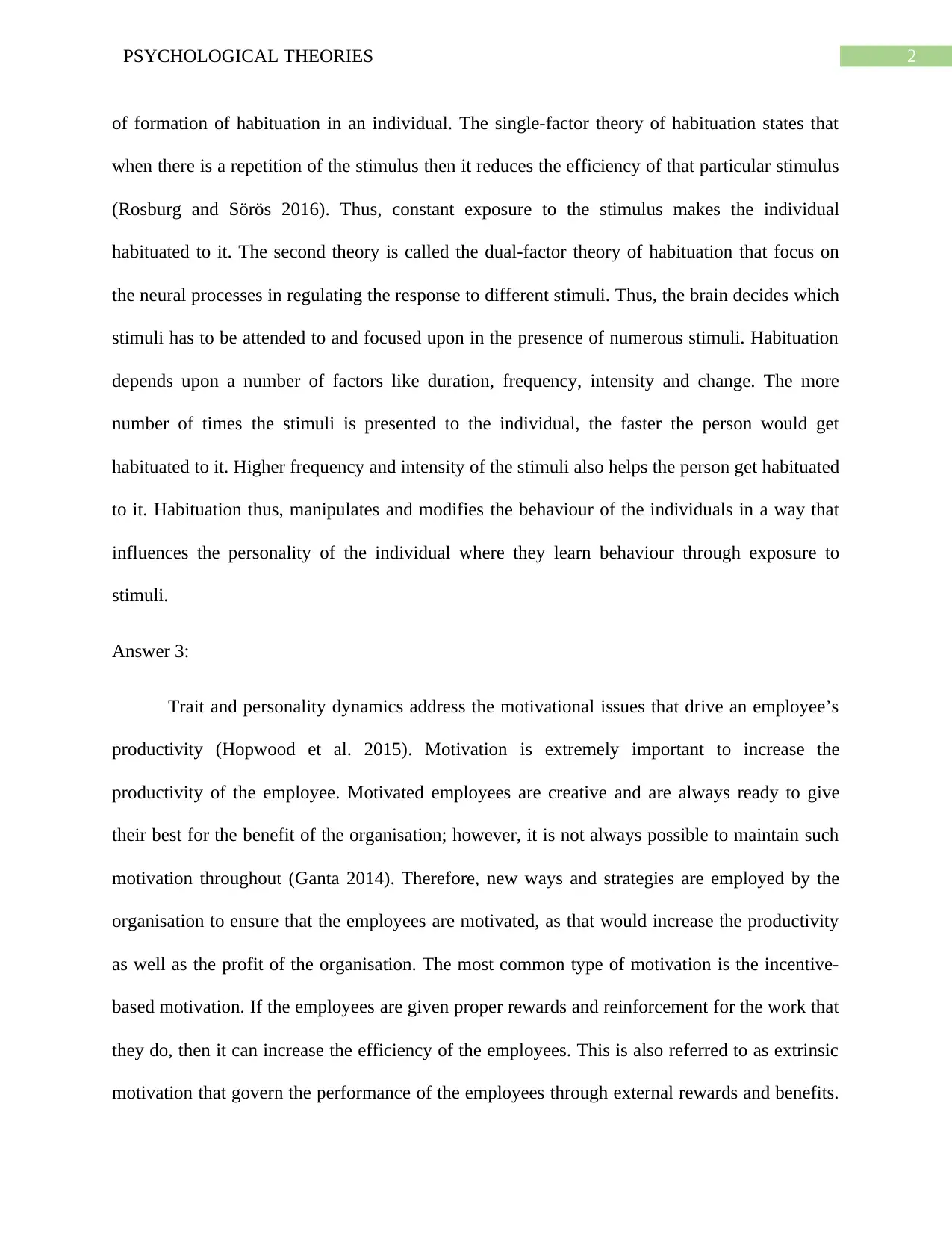
2PSYCHOLOGICAL THEORIES
of formation of habituation in an individual. The single-factor theory of habituation states that
when there is a repetition of the stimulus then it reduces the efficiency of that particular stimulus
(Rosburg and Sörös 2016). Thus, constant exposure to the stimulus makes the individual
habituated to it. The second theory is called the dual-factor theory of habituation that focus on
the neural processes in regulating the response to different stimuli. Thus, the brain decides which
stimuli has to be attended to and focused upon in the presence of numerous stimuli. Habituation
depends upon a number of factors like duration, frequency, intensity and change. The more
number of times the stimuli is presented to the individual, the faster the person would get
habituated to it. Higher frequency and intensity of the stimuli also helps the person get habituated
to it. Habituation thus, manipulates and modifies the behaviour of the individuals in a way that
influences the personality of the individual where they learn behaviour through exposure to
stimuli.
Answer 3:
Trait and personality dynamics address the motivational issues that drive an employee’s
productivity (Hopwood et al. 2015). Motivation is extremely important to increase the
productivity of the employee. Motivated employees are creative and are always ready to give
their best for the benefit of the organisation; however, it is not always possible to maintain such
motivation throughout (Ganta 2014). Therefore, new ways and strategies are employed by the
organisation to ensure that the employees are motivated, as that would increase the productivity
as well as the profit of the organisation. The most common type of motivation is the incentive-
based motivation. If the employees are given proper rewards and reinforcement for the work that
they do, then it can increase the efficiency of the employees. This is also referred to as extrinsic
motivation that govern the performance of the employees through external rewards and benefits.
of formation of habituation in an individual. The single-factor theory of habituation states that
when there is a repetition of the stimulus then it reduces the efficiency of that particular stimulus
(Rosburg and Sörös 2016). Thus, constant exposure to the stimulus makes the individual
habituated to it. The second theory is called the dual-factor theory of habituation that focus on
the neural processes in regulating the response to different stimuli. Thus, the brain decides which
stimuli has to be attended to and focused upon in the presence of numerous stimuli. Habituation
depends upon a number of factors like duration, frequency, intensity and change. The more
number of times the stimuli is presented to the individual, the faster the person would get
habituated to it. Higher frequency and intensity of the stimuli also helps the person get habituated
to it. Habituation thus, manipulates and modifies the behaviour of the individuals in a way that
influences the personality of the individual where they learn behaviour through exposure to
stimuli.
Answer 3:
Trait and personality dynamics address the motivational issues that drive an employee’s
productivity (Hopwood et al. 2015). Motivation is extremely important to increase the
productivity of the employee. Motivated employees are creative and are always ready to give
their best for the benefit of the organisation; however, it is not always possible to maintain such
motivation throughout (Ganta 2014). Therefore, new ways and strategies are employed by the
organisation to ensure that the employees are motivated, as that would increase the productivity
as well as the profit of the organisation. The most common type of motivation is the incentive-
based motivation. If the employees are given proper rewards and reinforcement for the work that
they do, then it can increase the efficiency of the employees. This is also referred to as extrinsic
motivation that govern the performance of the employees through external rewards and benefits.
⊘ This is a preview!⊘
Do you want full access?
Subscribe today to unlock all pages.

Trusted by 1+ million students worldwide
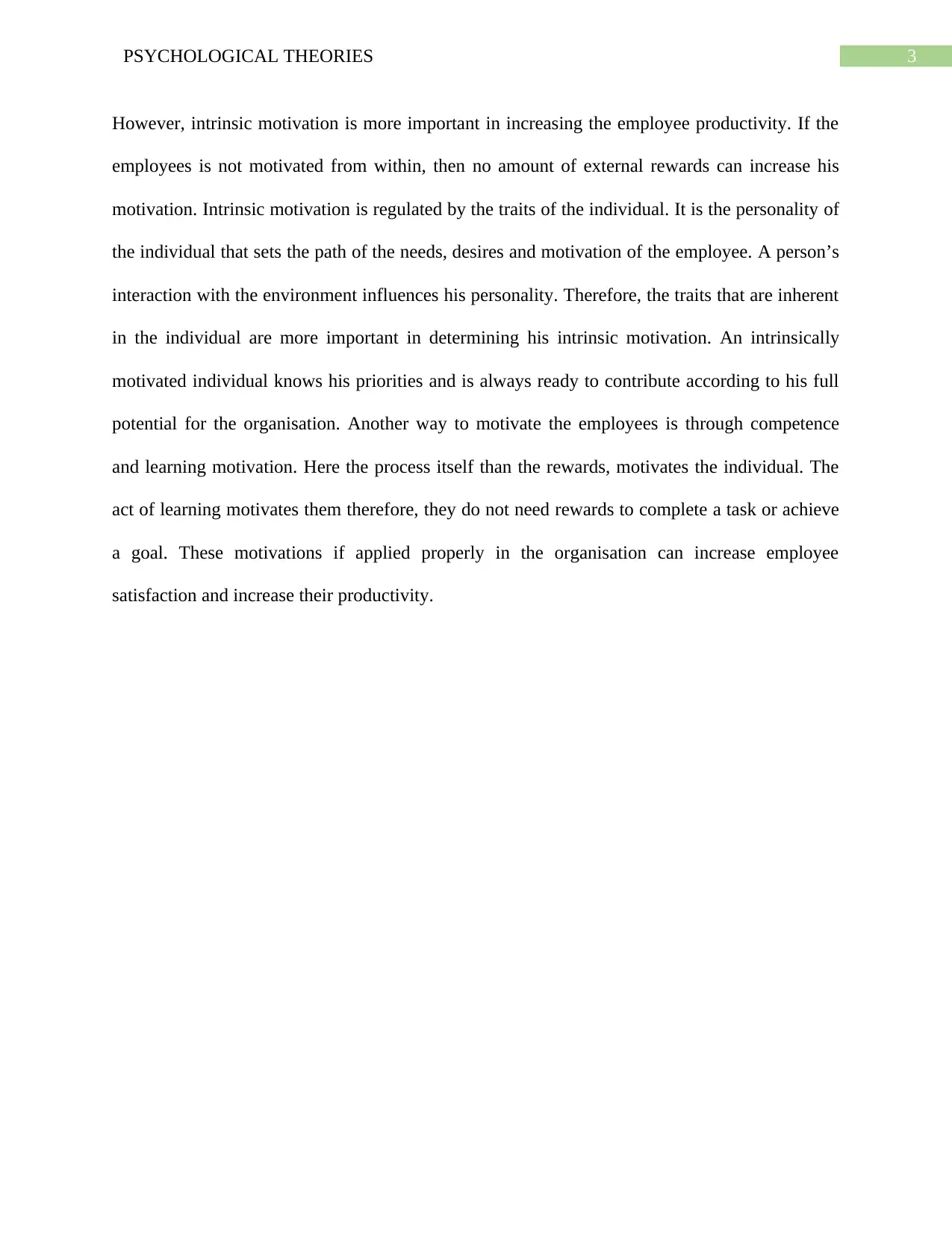
3PSYCHOLOGICAL THEORIES
However, intrinsic motivation is more important in increasing the employee productivity. If the
employees is not motivated from within, then no amount of external rewards can increase his
motivation. Intrinsic motivation is regulated by the traits of the individual. It is the personality of
the individual that sets the path of the needs, desires and motivation of the employee. A person’s
interaction with the environment influences his personality. Therefore, the traits that are inherent
in the individual are more important in determining his intrinsic motivation. An intrinsically
motivated individual knows his priorities and is always ready to contribute according to his full
potential for the organisation. Another way to motivate the employees is through competence
and learning motivation. Here the process itself than the rewards, motivates the individual. The
act of learning motivates them therefore, they do not need rewards to complete a task or achieve
a goal. These motivations if applied properly in the organisation can increase employee
satisfaction and increase their productivity.
However, intrinsic motivation is more important in increasing the employee productivity. If the
employees is not motivated from within, then no amount of external rewards can increase his
motivation. Intrinsic motivation is regulated by the traits of the individual. It is the personality of
the individual that sets the path of the needs, desires and motivation of the employee. A person’s
interaction with the environment influences his personality. Therefore, the traits that are inherent
in the individual are more important in determining his intrinsic motivation. An intrinsically
motivated individual knows his priorities and is always ready to contribute according to his full
potential for the organisation. Another way to motivate the employees is through competence
and learning motivation. Here the process itself than the rewards, motivates the individual. The
act of learning motivates them therefore, they do not need rewards to complete a task or achieve
a goal. These motivations if applied properly in the organisation can increase employee
satisfaction and increase their productivity.
Paraphrase This Document
Need a fresh take? Get an instant paraphrase of this document with our AI Paraphraser
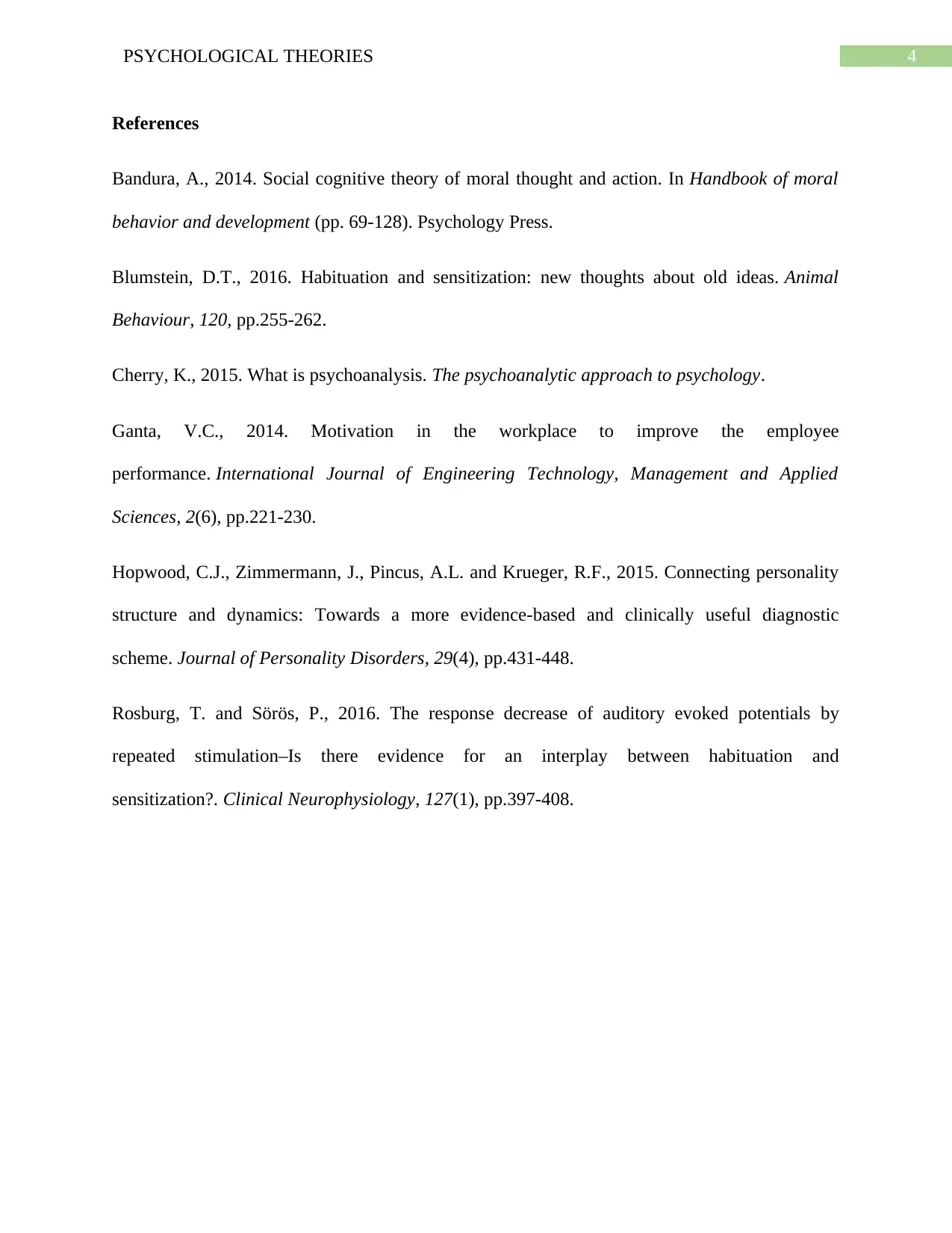
4PSYCHOLOGICAL THEORIES
References
Bandura, A., 2014. Social cognitive theory of moral thought and action. In Handbook of moral
behavior and development (pp. 69-128). Psychology Press.
Blumstein, D.T., 2016. Habituation and sensitization: new thoughts about old ideas. Animal
Behaviour, 120, pp.255-262.
Cherry, K., 2015. What is psychoanalysis. The psychoanalytic approach to psychology.
Ganta, V.C., 2014. Motivation in the workplace to improve the employee
performance. International Journal of Engineering Technology, Management and Applied
Sciences, 2(6), pp.221-230.
Hopwood, C.J., Zimmermann, J., Pincus, A.L. and Krueger, R.F., 2015. Connecting personality
structure and dynamics: Towards a more evidence-based and clinically useful diagnostic
scheme. Journal of Personality Disorders, 29(4), pp.431-448.
Rosburg, T. and Sörös, P., 2016. The response decrease of auditory evoked potentials by
repeated stimulation–Is there evidence for an interplay between habituation and
sensitization?. Clinical Neurophysiology, 127(1), pp.397-408.
References
Bandura, A., 2014. Social cognitive theory of moral thought and action. In Handbook of moral
behavior and development (pp. 69-128). Psychology Press.
Blumstein, D.T., 2016. Habituation and sensitization: new thoughts about old ideas. Animal
Behaviour, 120, pp.255-262.
Cherry, K., 2015. What is psychoanalysis. The psychoanalytic approach to psychology.
Ganta, V.C., 2014. Motivation in the workplace to improve the employee
performance. International Journal of Engineering Technology, Management and Applied
Sciences, 2(6), pp.221-230.
Hopwood, C.J., Zimmermann, J., Pincus, A.L. and Krueger, R.F., 2015. Connecting personality
structure and dynamics: Towards a more evidence-based and clinically useful diagnostic
scheme. Journal of Personality Disorders, 29(4), pp.431-448.
Rosburg, T. and Sörös, P., 2016. The response decrease of auditory evoked potentials by
repeated stimulation–Is there evidence for an interplay between habituation and
sensitization?. Clinical Neurophysiology, 127(1), pp.397-408.
1 out of 5
Related Documents
Your All-in-One AI-Powered Toolkit for Academic Success.
+13062052269
info@desklib.com
Available 24*7 on WhatsApp / Email
![[object Object]](/_next/static/media/star-bottom.7253800d.svg)
Unlock your academic potential
Copyright © 2020–2026 A2Z Services. All Rights Reserved. Developed and managed by ZUCOL.





